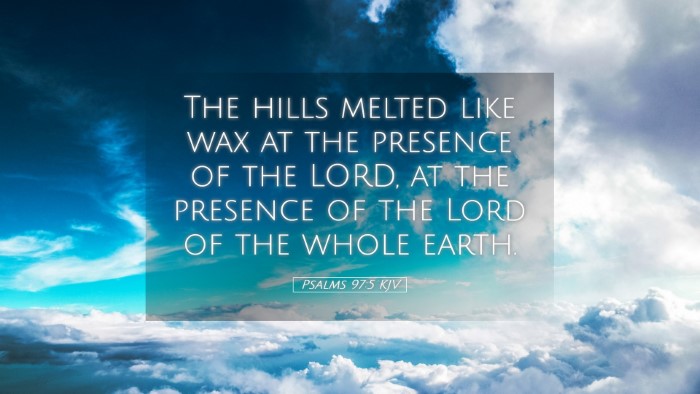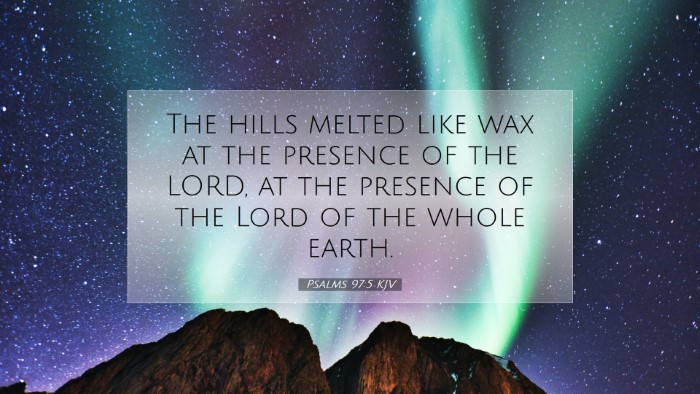Psalms 97:5 Commentary
Verse: "The hills melted like wax at the presence of the Lord, at the presence of the Lord of the whole earth."
Introduction
The verse in question, Psalms 97:5, conveys a profound message about the power and majesty of God. It emphasizes God’s sovereignty not only over creation but also His ability to instill fear and reverence among all of creation. This commentary aims to explore insights from notable public domain commentators such as Matthew Henry, Albert Barnes, and Adam Clarke, examining the implications of this verse for pastors, students, theologians, and scholars.
Textual Analysis
The use of "hills" metaphorically represents strength and stability, often viewed as immovable structures within the natural order. The imagery of hills melting like wax underlines a supernatural event that occurs in the presence of the Lord, suggesting that no earthly strength can withstand Divine authority.
Insights from Matthew Henry
Divine Majesty: Henry elucidates the extraordinary nature of God’s power. He notes that the melting of the hills reflects a dramatic act of judgment and transformation that occurs in the face of God’s majesty. This indicates a divine intervention that overrides all human conceptions of permanence.
Covenantal Context: Matthew Henry highlights the covenant relationship between God and His people. He explains that for the righteous, God's presence brings joy and safety, while for the wicked, His presence brings terror and destruction. This duality emphasizes the importance of living in a manner that is pleasing to God.
Insights from Albert Barnes
The Universal Sovereignty of God: Barnes emphasizes that the phrase "the Lord of the whole earth" underlines God’s dominion over all creation. The melting of hills symbolizes the universal influence of divine authority, suggesting that nature itself is subject to God's will.
Reflection on Creation: Barnes encourages readers to reflect on the natural world as a manifestation of God’s power. He implies that just as hills can melt before God, so can the hardest of hearts become soft before His presence. Barnes urges believers to recognize their dependence on God and the vulnerability of earthly foundations when faced with divine authority.
Insights from Adam Clarke
Symbolic Interpretation: Clarke interprets the 'hills melting like wax' as a metaphor for the manifestation of God’s presence causing a radical change in the landscape of human experience. This transformation is not just physical but spiritual, indicating that God’s presence can change hearts and minds.
Encouragement for Believers: Clarke offers an encouraging view that the melting of the hills signifies God’s protective hand over His children. The imagery of melting highlights that while God’s power can bring fear to some, it also signifies the softening and molding of believers’ hearts in His presence.
Theological Implications
This passage speaks to significant theological themes, including:
- Transcendence and Immanence: God’s ability to melt mountains signifies His transcendence over creation, yet His involvement indicates His immanence among His people.
- Creation’s Response to the Creator: The earth’s reaction serves as a reminder that all creation is responsive to God's authority and serves His purposes.
- Judgment and Mercy: The dual nature of God’s presence as terrifying for the unrighteous while being a source of comfort for the righteous challenges believers to reflect on their relationship with God.
Practical Applications
The implications of Psalms 97:5 for contemporary believers are profound:
- Prepare for God’s Presence: Believers are encouraged to approach God with the recognition of His power and majesty, fostering a spirit of awe and reverence in worship.
- Live Righteously: The dichotomy presented in this passage calls for an examination of one’s life. It is essential for believers to live in a way that pleases God, understanding the blessings that flow from His presence.
- Witness from Creation: Acknowledging God’s sovereignty reflected through nature should inspire believers to share the gospel, as creation itself proclaims His existence and power.
Conclusion
Psalms 97:5 stands as a powerful testament to the majesty and authority of God. The merging of the natural world’s response to the Divine forms a cornerstone in understanding God’s omnipotence. Through the reflections of Matthew Henry, Albert Barnes, and Adam Clarke, we gain a deeper understanding of how this verse speaks to our lives today. As pastors, students, theologians, and scholars, we are called to respond to God’s greatness with obedience, reverence, and a commitment to proclaiming His word to the world.


